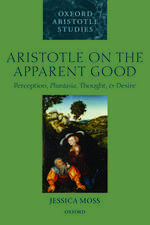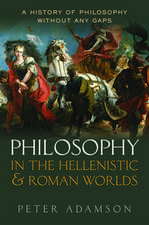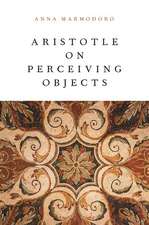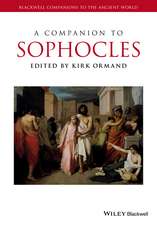The Roman Stoics: Self, Responsibility, and Affection
Autor Gretchen Reydams-Schilsen Limba Engleză Paperback – 22 iun 2006
Roman Stoics of the imperial period developed a distinctive model of social ethics, one which adapted the ideal philosophical life to existing communities and everyday societal values. Gretchen Reydams-Schils’s innovative book shows how these Romans—including such philosophers as Marcus Aurelius, Seneca, Hierocles, and Epictetus—applied their distinct brand of social ethics to daily relations and responsibilities, creating an effective model of involvement and ethical behavior in the classical world.
The Roman Stoics reexamines the philosophical basis that instructed social practice in friendship, marriage, parenting, and community life. From this analysis, Stoics emerge as neither cold nor detached, as the stereotype has it, but all too aware of their human weaknesses. In a valuable contribution to current discussions in the humanities on identity, autonomy, and altruism, Reydams-Schils ultimately conveys the wisdom of Stoics to the citizens of modern society.
The Roman Stoics reexamines the philosophical basis that instructed social practice in friendship, marriage, parenting, and community life. From this analysis, Stoics emerge as neither cold nor detached, as the stereotype has it, but all too aware of their human weaknesses. In a valuable contribution to current discussions in the humanities on identity, autonomy, and altruism, Reydams-Schils ultimately conveys the wisdom of Stoics to the citizens of modern society.
| Toate formatele și edițiile | Preț | Express |
|---|---|---|
| Paperback (1) | 286.29 lei 6-8 săpt. | |
| University of Chicago Press – 22 iun 2006 | 286.29 lei 6-8 săpt. | |
| Hardback (1) | 581.36 lei 6-8 săpt. | |
| University of Chicago Press – 23 mar 2005 | 581.36 lei 6-8 săpt. |
Preț: 286.29 lei
Nou
Puncte Express: 429
Preț estimativ în valută:
54.78€ • 59.69$ • 46.16£
54.78€ • 59.69$ • 46.16£
Carte tipărită la comandă
Livrare economică 23 aprilie-07 mai
Preluare comenzi: 021 569.72.76
Specificații
ISBN-13: 9780226710266
ISBN-10: 0226710262
Pagini: 224
Dimensiuni: 152 x 229 x 15 mm
Greutate: 0.31 kg
Ediția:Revised
Editura: University of Chicago Press
Colecția University of Chicago Press
ISBN-10: 0226710262
Pagini: 224
Dimensiuni: 152 x 229 x 15 mm
Greutate: 0.31 kg
Ediția:Revised
Editura: University of Chicago Press
Colecția University of Chicago Press
Notă biografică
Gretchen Reydams-Schils is associate professor in the Program of Liberal Studies at the University of Notre Dame. She is the author of Demiurge and Providence: Stoic and Platonist Readings of Plato’s "Timaeus," and An Anthology of Snakebites: On Women, Love and Philosophy.
Cuprins
Acknowledgments
List of Abbreviations
Introduction
1. The Self as a Mediator
2. From Self-Sufficiency to Human Bonding
3. Politics, the Philosophical Life, and Leisure
4. Parenthood
5. Marriage and Community
Bibliography
Index of Passages Cited
General Index
List of Abbreviations
Introduction
1. The Self as a Mediator
2. From Self-Sufficiency to Human Bonding
3. Politics, the Philosophical Life, and Leisure
4. Parenthood
5. Marriage and Community
Bibliography
Index of Passages Cited
General Index
Recenzii
"This is a clear, engaging discussion that takes a fresh perspective on Roman Stoicism."
--Elizabeth Asmis, University of Chicago
--Elizabeth Asmis, University of Chicago
"Reydams-Schils provides a well-balanced, thoughtful, and suggestive account of Roman Stoic thought. Original and innovative, The Roman Stoics is successful in bringing out interest in Roman Stoicism for areas of contemporary concern, without any loss of historical perspective. It is an interesting and useful addition to scholarship in an area that is at the forefront of current scholarly concern and also of wider public appeal."
"Reydams-Schils's thoughtful, well-documented argument gives the lie to the 'stereotypical image of the Stoics as being cold and detached.' Rather, Roman Stoicism in its late flowering, from Seneca and Musonius Rufus to Epictetus and Marcus Aurelius, reveals itself as a difficult, challenging, indeed 'lifelong balancing act' between self-care and involvement with others, philosophical ideals and everyday circumstances, moral reserve and personal affection—not least between husband and wife."
"In her fine and innovative treatment of the Roman Stoics, Gretchen Reydams-Schils shows that their theorization of the embedded self and their consistent attention to questions of practical ethics should not be interpreted as an uncritical endorsement of the social conditions of imperial Rome. Reydams-Schils highlights the egalitarian thrust of Stoicism: putting the nobility of the soul above nobility of birth, and positing an equal capacity for reason in both men and women, the Roman Stoics transcended the conventional morality of their society. Given the great significance of Stoicism for the ulterior history of European thought, this book makes a major contribution to intellectual history."
"In this clear and well-argued book, Reydams-Schils studies the philosophical basis that underpins the way Roman Stoics integrated philosophy itno the social practice of living. . . . Classicists, philosophers, and a wider public interested in the issues discussed here will no doubt benefit from the reading of this excellent book. . . A very valuable (and enjoyable) contribution to Stoic scholarship."
"What is particularly valuable about this book is the very attempt to map less well-explored areas of Stoic concern and the clear way in which practical ethics is related at every point to the basic physical and ethical doctrines of the Stoa."
"Anyone interested in Stoicism at all will find the book impressive and valuable."
"Taken as a whole, the book seems to me highly successful. It offers what is, to my knowledge, the first sustained account of social ethics in Roman Stoicism. . . . The emphasis on social and familial embeddedness captures a genuine dimension of Stoicism and one that is often understated or undervalued by scholars. . . . The book is written in an accessible and informative style that will make it useful to scholars and students of Roman social history as well as ancient philosophy."
"The Roman Stoics sets a standard for innovative approaches . . . and is a solid contribution to our growing appreciation of the uniqueness of the Roman Stoicism."

















